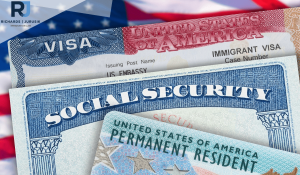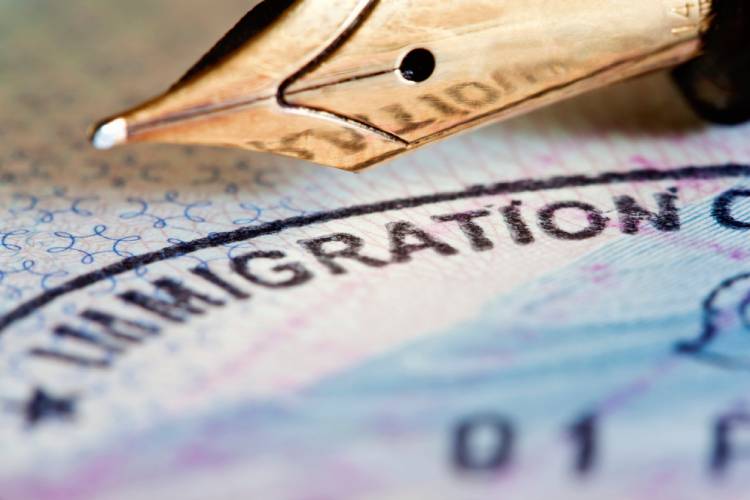A permanent resident is someone who has been granted authorization to live and work in the United States on a permanent basis. As proof of that status, a person is granted a permanent resident card, commonly called a “green card.”
You can become a permanent resident in several different ways. Most individuals are sponsored by a family member or employer in the United States. In some cases, you may be eligible to file for yourself. The steps to become a permanent resident are different for each category and will depend on if you are currently living inside or outside the United States.
Who qualifies for a Green Card through employment sponsorship?
EB-1 Priority Workers
You may be eligible for an Employment-based First Preference EB-1 Visa if you have an extraordinary ability, are an outstanding professor or researcher, or are a multinational executive or manager.
Green Card Requirements for EB-1 Priority Workers
- EB-1A: Extraordinary ability. You must be able to demonstrate extraordinary ability in the sciences, arts, education, business, or athletics through sustained national or international acclaim. Your achievements must be recognized in your field through extensive documentation. No offer of employment is required. You must meet 3 out of the 10 listed criteria below to prove extraordinary ability in your field:
- Evidence of receipt of lesser nationally or internationally recognized prizes or awards for excellence
- Evidence of your membership in associations in the field which demand outstanding achievement of their members
- Evidence of published material about you in professional or major trade publications or other major media
- Evidence that you have been asked to judge the work of others, either individually or on a panel
- Evidence of your original scientific, scholarly, artistic, athletic, or business-related contributions of major significance to the field
- Evidence of your authorship of scholarly articles in professional or major trade publications or other major media
- Evidence that your work has been displayed at artistic exhibitions or showcases
- Evidence of your performance of a leading or critical role in distinguished organizations
- Evidence that you command a high salary or other significantly high remuneration in relation to others in the field
- Evidence of your commercial successes in the performing arts
- EB-1B: Outstanding professors and researchers. You must demonstrate international recognition for your outstanding achievements in a particular academic field. You must have at least 3 years of experience in teaching or research in that academic area. You must be entering the United States in order to pursue tenure or tenure track teaching or comparable research position at a university or other institution of higher education. Examples of documentary evidence include:
- Evidence of receipt of major prizes or awards for outstanding achievement
- Evidence of membership in associations that require their members to demonstrate outstanding achievement
- Evidence of published material in professional publications written by others about the alien’s work in the academic field
- Evidence of participation, either on a panel or individually, as a judge of the work of others in the same or allied academic field
- Evidence of original scientific or scholarly research contributions in the field
- Evidence of authorship of scholarly books or articles (in scholarly journals with international circulation) in the field
- EB-1C: Multinational manager or executive. You must have been employed outside the United States in the three (3) years preceding the petition for at least one (1) year by a firm or corporation and you must be seeking to enter the United States to continue service to that firm or organization. Your employment must have been outside the United States in a managerial or executive capacity and with the same employer, an affiliate, or a subsidiary of the employer.
EB-2 Priority Workers
You may be eligible for an Employment-based Second Preference EB-2 Visa if you are a member of the professions holding an advanced degree or its equivalent, or a foreign national who has exceptional ability.
Green Card Requirements for EB-2 Priority Workers
- EB-2A: Advanced degree. The job you apply for must require an advanced degree and you must possess such a degree or its equivalent (a baccalaureate degree plus 5 years progressive work experience in the field).
- EB-2B: Exceptional ability. You must be able to show exceptional ability in the sciences, arts, or business. Exceptional ability means “a degree of expertise significantly above that ordinarily encountered in the sciences, arts, or business.” You must meet at least three of the criteria listed below:
- Official academic record showing that you have a degree, diploma, certificate, or similar award from a college, university, school, or other institution of learning relating to your area of exceptional ability
- Letters documenting at least 10 years of full-time experience in your occupation
- A license to practice your profession or certification for your profession or occupation
- Evidence that you have commanded a salary or other remuneration for services that demonstrates your exceptional ability
- Membership in a professional association(s)
- Recognition for your achievements and significant contributions to your industry or field by your peers, government entities, professional or business organizations
- Other comparable evidence of eligibility is also acceptable
EB-3 Priority Workers
You may be eligible for an Employment-based Third Preference EB-3 Visa if you are a skilled worker, professional, or another worker.
Green Card Requirements for EB-3 Priority Workers
- EB-3A: Skilled workers. “Skilled workers” are persons whose job requires a minimum of two (2) years of training or work experience, not of a temporary or seasonal nature. You must be performing work for which qualified workers are not available in the United States. Labor certification and a permanent full-time job offer are required.
- EB-3B: Professionals. “Professionals” are persons whose job requires at least a US baccalaureate degree or a foreign equivalent and are members of their professions. You must be performing work for which qualified workers are not available in the United States. Education and experience may not be substituted for a baccalaureate degree. Labor certification and a permanent full-time job offer are required.
- EB-3C: Other workers. The “other workers” subcategory is for persons performing unskilled labor requiring less than two (2) years of training or experience, not of a temporary or seasonal nature. At the time the petition is filed on your behalf, you must be capable of performing unskilled labor that is not of a temporary or seasonal nature, for which qualified workers are not available in the United States. Labor certification and a permanent full-time job offer are required.
EB-4 Priority Workers
Several special immigrant categories may also be eligible for an Employment-based Fourth Preference EB-4 Visa.
Special Immigrant Categories for EB-4 Priority Workers
The following special immigrant categories apply for EB-4 visas:- Religious ministers and workers
- Broadcasters
- Iraqi/Afghan translators
- Iraqis who have assisted the United States
- International organization employees
- Physicians
- Armed forces members
- Panama Canal Zone employees
- Retired NATO-6 employees
- Spouses and children of deceased NATO-6 employees
How do I obtain my Green Card through employment sponsorship?
Applying for a Green Card
In most cases, the employer must apply for a green card on behalf of the employee, completing and submitting the following:
- USCIS Form I-140, Petition for Alien Workers
- A completed and properly executed DOL ETA Form 9089, Application for Permanent Employment Certification
- A valid prevailing wage determination (PWD) issued by the DOL
- A properly executed posting notice
- Copies of all in-house media, whether electronic or printed, in accordance with the normal procedures used in the employer’s organization for the recruitment of positions similar to that specified on ETA Form 9089
- Evidence that the beneficiary meets the specific DOL requirements for their profession
- Proof a full-time permanent employment offer to the beneficiary
- Any and all other documentation that is required to show eligibility for a green card with respect to their profession
(Learn more about special streamlined green card processing for “Schedule A” professions.)
PERM & Labor Certification
A permanent labor certification issued by the Department of Labor (DOL) allows an employer to hire a foreign worker to work permanently in the United States. In most instances, before the US employer can submit an immigration petition to the Department of Homeland Security’s US Citizenship & Immigration Services (USCIS), the employer must obtain an approved labor certification request from the DOL’s Employment and Training Administration (ETA). The DOL must certify to the USCIS that there are no qualified US workers able, willing, qualified, and available to accept the job at the prevailing wage for that occupation in the area of intended employment, and that employment of the alien will not adversely affect the wages and working conditions of similarly employed US workers.
In order to qualify for Permanent Labor Certification:
- The employer must hire a foreign worker as a full-time employee.
- There must be a bona fide job opening available to US workers.
- Job requirements must adhere to what is customarily required for the occupation in the US, and may not be tailored to the foreign worker’s qualifications. In addition, the employer shall document that the job opportunity has been and is being described without unduly restrictive job requirements unless adequately documented as arising from business necessity.
- The employer must pay at least the prevailing wage for the occupation in the area of intended employment.
Take the Worry Out of the Petition Process—Hire an Immigration Lawyer
The process of obtaining labor certification is very detail-oriented, time-sensitive, and is frequently intimidating. In order to facilitate this process and achieve positive results, counsel is often retained.
If you want to apply for a green card (permanent resident status) based on the fact that you have a permanent employment opportunity in the United States, or if you are an employer that wants to sponsor someone for a green card based on permanent employment in the United States, we have several years of experience determining the best possible way to obtain a green card.
The green card lawyers at Richards and Jurusik Immigration Law have successfully assisted our clients in obtaining PERM Labor Certifications and Special Handling Labor Certifications. We are familiar with the intricate details of ETA Form 9089, and understand what the Department of Labor looks for when certifying them. We obtain successful labor certifications on a regular basis, and can help you complete this very important step in the permanent employment process. We pride ourselves on obtaining successful results for our clients. It is our goal to serve you promptly, efficiently, and successfully. In many cases, we are able to take immediate action on your behalf.
We Can Help You Get Your Green Card
At Richards and Jurusik Immigration Law, we focus our legal practice on the Immigration and Nationality Laws of the United States. We have helped hundreds of foreign nationals and employers petition for Green Cards and permanent resident status through employment sponsorship, including the preparation, filing, and successful adjudication of green cards.
Our Resources for Green Cards through Employment
Additional Outside Resources
- USCIS: Green Card
- USCIS: Employment-Based Immigration: First Preference EB-1
- USCIS: Employment-Based Immigration: Second Preference EB-2
- USCIS: Employment-Based Immigration: Third Preference EB-3
- USCIS: Employment-Based Immigration: Fourth Preference EB-4
- USCIS: I-140, Immigrant Petition for Alien Workers
- USDOL: Forms (for ETA 9089)
- USDOL: Permanent Labor Certification
- USCIS: Chapter 7 – Schedule A Designation Petitions
The Arrive Podcast
With 1 to 2 new episodes each month, the Arrive Podcast can help you stay updated on the US immigration matters that matter the most to you.
Our US Immigration Videos
Richards and Jurusik Immigration Law regularly creates video content about the current state of a certain aspect of US immigration law, and how it applies to Canadians living and working in the United States today.











